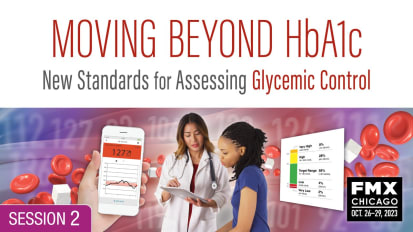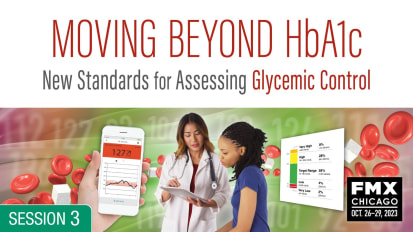Moving Beyond HbA1c: New Standards for the Family Physician
The Evidence and Role of Sensor-Based CGM for Improving Patient Care and Satisfaction in Persons with Type 2 Diabetes

Program Medium
Internet-based program
Method of Physician Participation Utilized in Learning Process
There are no fees for participating and receiving CME credit for this activity. During the period October 27, 2023 through October 27, 2025, participants must 1) read the learning objectives and faculty disclosures; 2) study the educational activity, and are expected to view the activity, totaling 1.5 hours, to successfully complete the activity and earn CME credit; 3) register and complete the evaluation form and post-test; 4) score 100% on the post-test; and 5) print out CME certificate.
Estimated Time to Complete Educational Activity
1.5 hours. Physicians must study the enduring activity, and are expected to view every segment to successfully complete the activity and earn CME credit.
Course Overview
In this web-based program, physicians will learn how recent developments in sensor-based continuous glucose monitoring have advanced the management of Type 2 and Type 1 diabetes.
Release Date
October 27, 2023
Expiration Date
October 27, 2025
Intended Audience
This complimentary CME educational activity is designed for all healthcare providers (HCPs) involved in developing, delivering, consulting, and monitoring care for patients with type 2 or type 1 diabetes, including family medicine specialists, primary care physicians, physician associates, endocrinologists, diabetes specialists, and related clinicians.
Registration
Participation in this activity is complimentary, and clinicians are invited to view this CME-certified program and/or share this invitation with other colleagues, departmental staff members, and healthcare professionals.
Grantor Support
This activity is supported by an independent medical education grant from Abbott Diabetes Care.
Accreditation Statement
This activity has been planned and implemented in accordance with the Essential Areas and policies of the Accreditation Council for Continuing Medical Education (ACCME) through the joint providership of the UMass Chan Medical School and CMEducation Resources, LLC. The UMass Chan Medical School is accredited by the ACCME to provide continuing medical education for physicians.
Credit Designation Statement
The UMass Chan Medical School, Office of Continuing Medical Education designates this enduring material for a maximum of 1.5 AMA PRA Category 1 Credits(s)TM. Physicians should claim only the credit commensurate with the extent of their participation in the activity.
Policy on Faculty & Provider Disclosure
It is the policy of the UMass Chan Medical School to ensure fair balance, independence, objectivity and scientific rigor in all activities. All faculty participating in CME activities sponsored by UMass Chan Medical School are required to present evidence-based data, identify and reference off-label product use and disclose all relevant financial relationships with those supporting the activity or others whose products or services are discussed. Faculty disclosure will be provided in the activity materials.
Program Faculty and Disclosure
Jeff Unger, MD, FAAFP, FACE – Program Chair
Director, Unger Primary Care Concierge Medical Group
Associate Medical Director Mission Hospice
Assistant Clinical Professor of Family Medicine, UC Riverside School of Medicine
Medical Director, Hathaway Recovery Center
Claremont, CA
Abbot Diabetes: Primary Care Advisory Board, Speaker.
Dexcom: Primary Care Advisory Board.
Medtronic Diabetes: Primary Care Advisory Board.
Eden Miller, DO
Founder
Diabetes and Obesity Care LLC
St. Charles Hospital
Bend, OR
Advisor or consultant: Abbott Laboratories; AstraZeneca Pharmaceuticals LP; Becton, Dickinson and Company; Intarcia Therapeutics, Inc.; Janssen Pharmaceuticals; Lilly; Novo Nordisk; Sanofi Aventis
Speaker or Speakers Bureau: AstraZeneca Pharmaceuticals LP; Boehringer Ingelheim Pharmaceuticals, Inc.; Janssen Pharmaceuticals; Lilly; Novo Nordisk
Eugene Wright, MD
Consulting Associate, Departments of Medicine
Duke University Medical Center Durham, NC
Inaugural Chair, ADA Primary Care Interest Group
Medical Director for Performance Improvement Charlotte Area Health Education Center
Charlotte, NC
Speakers’ Bureau: Abbott Diabetes, Bayer, BI, Eli Lilly, and Sanofi
Advisory boards: Abbott Diabetes, Bayer, BI, Eli Lilly, Medtronic, and Sanofi
Consultant: Abbott Diabetes, Bayer, BI, and Eli Lilly
Diana Isaacs, PharmD, BCPS, BCACP, CDCES, BC-ADM, FADCES, FCCP
Endocrine Clinical Pharmacy Specialist
CGM and Remote Monitoring Program Coordinator
Cleveland Clinic Endocrinology and Metabolist Institute
Cleveland, OH
Advisor or consultant for: Diatribe; Lilly; Sanofi; Undermyfork
Speaker or a member of a speakers bureau for: Abbott; Bayer; Dexcom; Insulet; Medtronic; Novo Nordisk; Xeris Pharmaceuticals
Program Managers and Web Editor Disclosure
Program Managers Gideon Bosker, MD and Denise Leary have nothing to disclose.
Educational Objectives
Upon completion of this activity, participants will be able to:
- Establish protocols and clinical decision trees for incorporating and implementing sensor-based CGM within the management workflow for diabetes care by family medicine and primary care specialists
- Execute the day-to-day, patient-centric mechanics of how CGM practice behaviors/devices are best incorporated by family medicine and primary care specialists and, specifically, initiate and maintain persons with diabetes on devices that facilitate CGM-based glycemic management of Type 2 diabetes (T2D)
- Explain the medical and health metrics-based rationale for incorporating sensor-based CGM as a foundational technology and clinical strategy to optimize glycemic management of persons with diabetes managed by family medicine and primary care specialists
- Implement clinical strategies based on sensor-based CGM into the mainstream practices in primary care to optimize management of persons with impaired glycemic control across the spectrum of diabetes care
- Outline the evidence-based support for sensor-based CGM to achieve optimal glycemic management in persons with T2D by family medicine and primary care specialists
- Interpret and apply the results of ambulatory glucose profiles (AGPs) that are generated by sensor-based CGM device, and educate patients about the treatment implications of these results
Hardware and Software Requirements:
To participate in this program, viewers must have a PC or Macintosh computer that has active, ongoing internet access for the duration of the program, as well as a compatible Flash-viewer. An email address is required for registration, and a printer is required to print out the CME certificate.
Privacy Policy
When you participate in a CME activity offered by CMEducation Resources, we ask you for your name, degree, affiliation, street address, telephone number, fax number, and/or e-mail address (the "Information"). We use that Information in the following ways:
- We use the Information to grade your post-test and to send you a certificate of completion of the CME activity. If we use a third-party company to grade your post-test and issue certificates of completion, we will give the Information to that company for that purpose only.
- For each CME activity that you take, you must complete an evaluation questionnaire. That questionnaire asks if you are willing to participate in a follow-up survey. If you answer yes, we will use your name and contact information to send you the survey.
- We may use the Information to send you information about other CME activities that CMEducation Resources is offering.
- If our company is acquired by or merged into another company, we may make the Information available to the new owner/entity to use in the ways described above, to enable it to continue our business.
- You should check this privacy policy periodically to see whether we have made any changes.
Disclaimer
Copyright © 2023 by CMEducation Resources, LLC All rights reserved.
Reproduction, distribution, or translation without express written permission is strictly prohibited.
Content on this webcast reflects the opinions, output, and analyses of experts, investigators, educators, and clinicians whose activities for, while independent, are commercially supported by the sponsor noted at the start of each activity.
Content on this webcast is not meant to be, nor substitute for national guidelines or recommendations generated by professional, academic societies, colleges, or associations.








